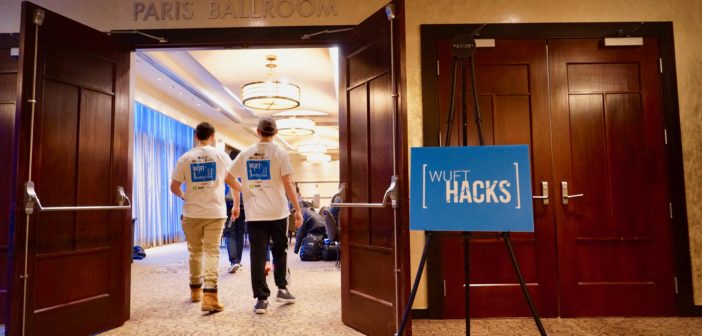After 36 hours of mixing business with technology, two groups of Lehigh students both won first place at the Wharton Undergraduate Fintech Hacks 2018, at University of Pennsylvania from Feb. 2-4.
Lehigh’s FinTech Group, a new student-run organization, co-hosted the hackathon along with the Wharton Undergraduate Fintech Group.
Out of 600 individuals who registered, 150 students — 45 from Lehigh — were chosen to compete. Lehigh and UPenn students competed against teams from Columbia, Cornell , Harvard and New York universities.
Dean Zimberg, ’20, the founder and president of the Lehigh FinTech Group, said some teams included students with extensive coding experience, however most teams had members with little to no coding ability. The hackathon also included business-focused prompts, which made for an unusual hackathon experience.
“Traditional hackathons are not representative of how the real business world works,” Zimberg said. “When a group of computer scientists builds an application or computer program, it has to be communicated effectively in layman’s terms to those that determine its financial viability.”
The two prompts included topics ranging from banking products and money movements to data and customer insights. Teams worked through breakout sessions as well workshops with professionals from the banking and technology industries. Two Lehigh teams received first place for both prompts and won a collective $7,500 in prize money.
The hackathon’s blend of business and computer science mimicked how the financial technology industry operates in reality.
“The industry is not just four or five back-end coders, it’s much more than that,” Zimberg said. “It’s multifaceted and hosts cross-pollination.”
The closing ceremony at Wharton Undergraduate FinTech Hacks 2018 allowed all participating teams to present their projects in a science-fair style exposition. Winning teams were required to present a deliverable on stage in addition to their exposition. Eight winning awards were given out, with half of the winning teams representing Lehigh.
John Cunningham, ’21, was a member of the Lehigh team that received first place for best technical use of Fintech. The team consisted of three first-year students and one sophomore.
“I had no expectations of success,” Cunningham said. “I just knew that my team and I designed, researched and built something we could be proud of either way. It was incredible to have the work of both the business and technical teams be validated.”
By attending the hackathon, Cunningham said he hoped to step back from the typical programming he taught himself and learned in classes at Lehigh and, instead, wanted to solve real-world problems.
Another Lehigh team won first place for most innovative use of Fintech. The team won this title without writing a single line of code.
Daniel Grumbles, ’21, said the group did not have the time or resources to program what they were envisioning.
“By focusing on innovative problem solving and creating a clear presentation of our solution, we succeeded in making an attractive proof of concept without writing any code,” Grumbles said.
Lehigh’s FinTech Group has partnered with the Martindale Center for the Study of Private Enterprise to begin work on future projects. Todd Watkins, a professor of economics and the executive director of the Martindale Center of Private Enterprise, said one of the goals of the center is to give students an understanding of developing economies and how technology plays a role in their improvement.
“The work that Lehigh FinTech is doing will give students the agency to have an impact on our future world economy,” Watkins said.
Zimberg said a core focus of their efforts is human welfare.
“We believe technology can fiscally empower those who are disadvantaged,” Zimberg said.






Comment policy
Comments posted to The Brown and White website are reviewed by a moderator before being approved. Incendiary speech or harassing language, including comments targeted at individuals, may be deemed unacceptable and not published. Spam and other soliciting will also be declined.
The Brown and White also reserves the right to not publish entirely anonymous comments.